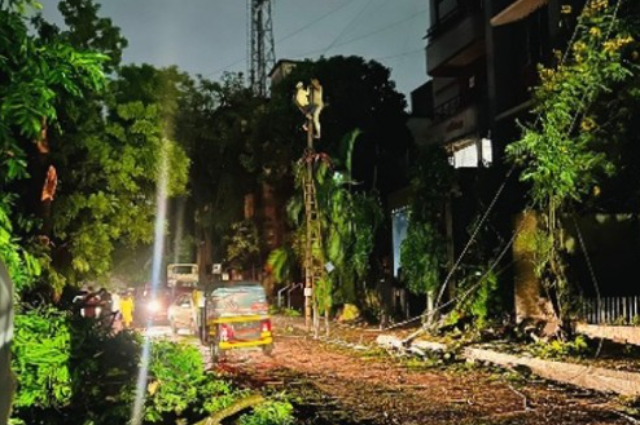
It’s been pouring heavily the last couple of days. My house is situated at the foot of a hill, surrounded by lush green forests. Oh yes, it is paradise! Come monsoon and the trees sway happily. Some stand strong, firmly rooted in the ground, while others battering the winds, fall on the electrical lines placed poorly on the narrow streets of my locality.
Recently, we have had many trees fall on the road, blocking them and cutting off the only exit to the outside world. The Pune Municipal Corporation, along with the fire brigade, arrive on the scene and within a few hours, electricity is restored, the roads are opened and life goes on. However, it was the morning of June 18th 2025, around 10 am in the morning. A scheduled power cut for tree trimming was announced. Undetected to them, a disaster was waiting to strike. An hour later, a huge tree fell yet again across the road. Unfortunately, this time, it fell not only over multiple wires but also on a young girl. And so, a scheduled power cut turned into an unscheduled one lasting a whole day and night.
Most of us don’t really care when the power goes out during the day. There’s sunlight, stuff to do, and enough distractions to keep us from spiralling. But the moment the sun sets? Instant chaos. Suddenly, we’re wandering around like confused bats, bumping into furniture we bought ourselves. Candles? Romantic in movies—completely useless when you’re trying to find the bathroom. Technology has spoiled us so much, we’ve basically forgotten how to survive a power cut without Wi-Fi, lights, even considering if it’s socially acceptable to go to bed at 7 pm or realizing how creepy our own house sounds in silence.
But maybe darkness isn’t the villain we’ve made it out to be. Maybe it’s just... misunderstood. Without the constant buzz of devices or the glare of screens, the night offers something rare: stillness. A pause. A chance to listen to sounds we usually drown out: the rustle of leaves, a distant dog barking, the peaceful rhythm of our own breath.
Instead of scrambling for light, what if we leaned into the dark? Lit a candle not for utility, but for mood. Sat with it. Maybe darkness isn’t empty—maybe it’s full of moments we’ve been too busy, too bright, to notice. Painful, bigger and brighter lights is what we’ve become accustomed to. Even vehicles these days have headlights that you cannot turn off during the day. At night, white street lights illuminate pathways. The brighter the light, the safer the streets they say. But why? Why can’t our roads be safer with warm yellow lights too? Like the ones seen on the streets of Pahalgam in Kashmir, India?
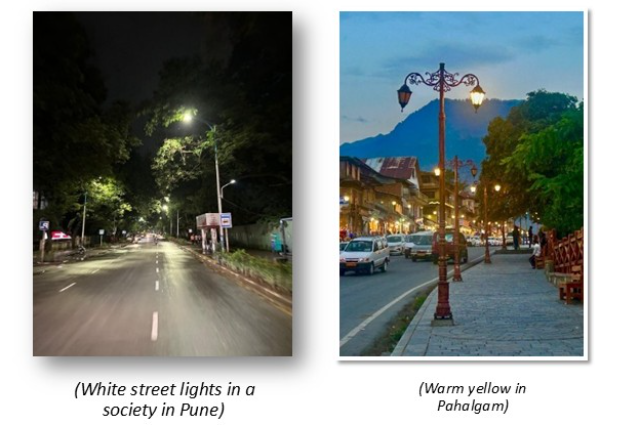
By just comparing the pictures, don’t you think that the white lights are stressing your eyes? I know mine are. On the other hand, the town of Pahalgam looks so rustic and picturesque, right? The soft amber hues, the gentle shadows, the absence of constant brightness—it’s like your eyes and your mind can finally exhale.
Darkness, when left unbothered by our LED obsession, can actually feel like a blanket. Calming. Cozy. It wraps around you, not to suffocate, but to say, "Hey, slow down. You’ve done enough for the day."
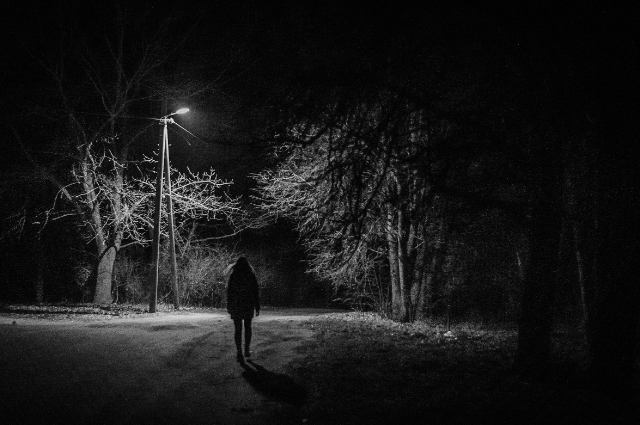
Photo by Eugene Lazovsky on Unsplash
So, as the evening rolled in, the electricity had still not been restored. For a while, lost in the chaos of the darkness, I was like everyone else. But my father had just installed a new inverter the day before, and it worked as smoothly as butter, illuminating our house like fireworks in a dark street. I could barely see my neighbours’ houses in the darkness. I called out to my mom and told her that it was a lovely night for a walk. She agreed. And off we went with an umbrella.
The streets were delightful. Quiet. Dark. Just as I like it. The air was crisp; the clouds had partially cleared and there was no sound of the dogs barking or signs of neighbours at home. Our feet stuck firmly on the road as it had just rained a few hours ago and so the road was wet, holding everything together. We took careful steps to avoid the puddles.
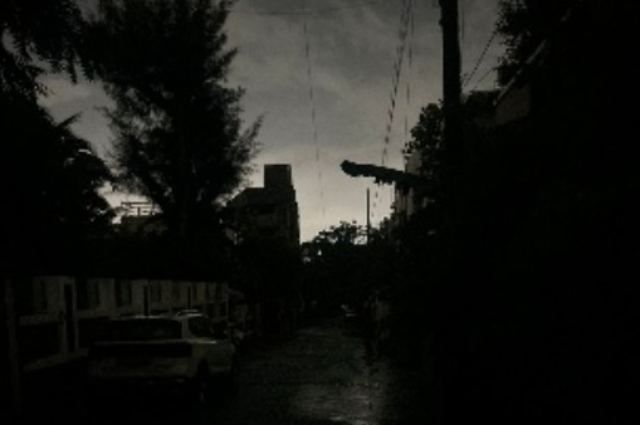
The dark streets in my society/ Image by Juhi H
We could only see the silhouettes of people as we passed them. I couldn’t make out the watchman at first and wondered to myself, “Could that be a thief taking advantage of the darkness”? But as we neared, he smiled and greeted us. In the darkness, every rustle becomes a criminal conspiracy. Every shadow is a suspect. A cat knocking over a bucket? Must be a ghost trying to contact us. That tiny sound from the cupboard? Definitely a rat... or a demon… or a rat possessed by a demon. The possibilities are endless when the power’s out and logic packs up early for the night.
But once you get past the initial panic and dramatic mental storytelling, the dark can actually be kind of magical. It forces you to slow down. You’re no longer jumping from one screen to another or scrolling endlessly while pretending to watch something in the background. No, no. The dark demands attention. It makes you sit with yourself—and maybe even the people around you. Conversations feel deeper. Laughter gets louder. Even the snacks taste better, possibly because you’re eating them like a rat yourself—blindly digging into a packet and hoping it’s not chili-flavored banana chips.
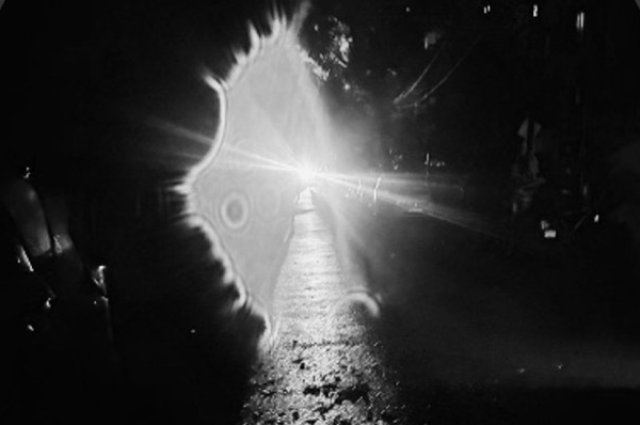
A ghost? A spider’s web? What do you make of it?
Shadows are the drama queens of the darkness—always larger than life, mysteriously stretching across walls like they’re auditioning for a suspense thriller. One minute, it’s just your coat hanging on a chair. Next, it’s a looming figure that could either be a murderer or a mildly dishevelled ghost with poor posture. I love shadows. They are actually kind of cool. They dance with candlelight, play hide-and-seek with your feet, and turn even the most ordinary objects into mysterious silhouettes. They don't exist without light—how poetic is that?
As we walked past a wall, my mother suddenly stood still, looking down at her shadow. In a silent voice she whispered, “Take a picture of my shadow.” There she was, struck by the simple beauty of her outline stretched across the wall like a quiet companion. I pulled out my phone, half expecting the shadow to strike a pose. She stood still, dignified, like it was a portrait session with the moon as lighting director.
The photo came out blurry, of course. Shadows don’t like being captured; they prefer mystery. But in that moment, I understood what she meant. There’s something oddly comforting about seeing your shadow—proof that you’re here, present, a silhouette stitched to the night. It’s humbling, too. No makeup, no filters, no good side. Just you and your outline, walking together in the soft glow of streetlamps. This beautiful silhouette is my mother!
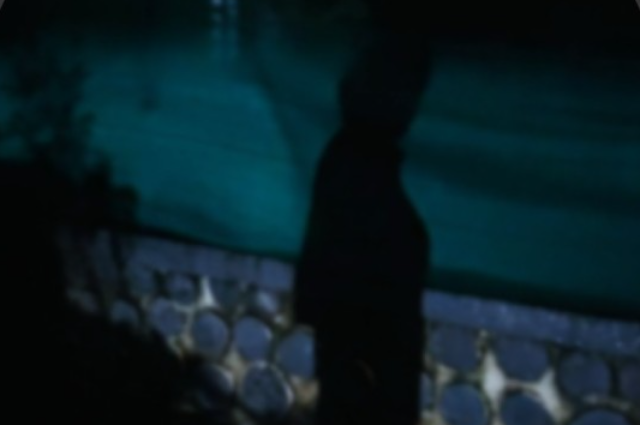
It was time to call it a night. I had my last two orange-scented candles. The night was peaceful. I sat there, staring at the small, gentle flame. I could hear my thoughts in the quiet of the night. A glass of warm milk in my hand, I felt cozy. It was around 11 pm. My parents were soundly sleeping in the room upstairs. I was secretly hoping that the night wouldn’t end, that the lights wouldn’t turn on again. This was my happy time. A blissful place.
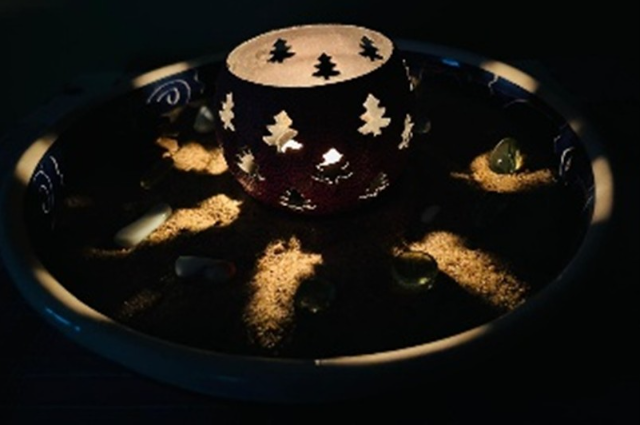
When the candle finally burned out, it did so quietly—no drama, no fuss. Just a quiet goodbye. I pulled my thick blanket tighter as the cool breeze drifted in through the window, and without even noticing, my eyes closed. Darkness, once so feared, had tucked me in gently. And there, in its quiet embrace, I drifted off, grateful that not all light needs to shine.
